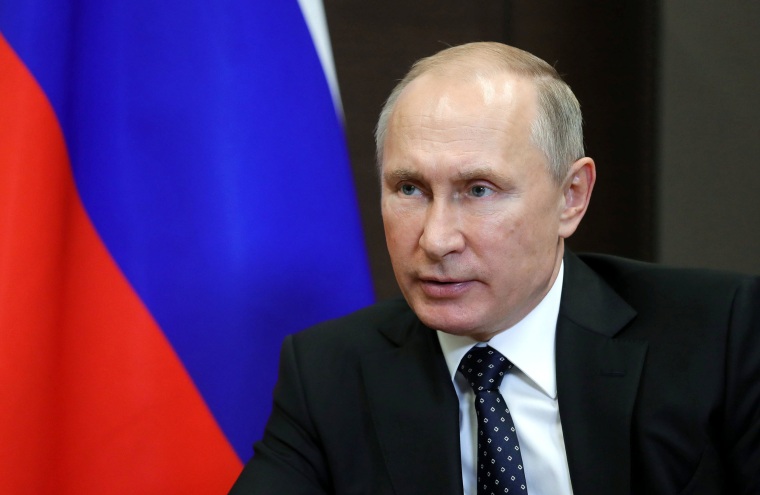WASHINGTON — One year after U.S. intelligence agencies detailed the scale and scope of Russian efforts to undermine the 2016 presidential election, the United States still lacks “a coherent, comprehensive and coordinated approach” to countering potential future threats from the Kremlin or elsewhere, a new Democratic congressional report finds.
President Donald Trump’s negligence in acknowledging and responding to the threat of continued Russian interference is among the biggest factors leaving the U.S. at risk, Democrats on the Senate Foreign Relations Committee assert in the report released Wednesday.
The 200-page document lays out in detail how Russia, over two decades under President Vladimir Putin, developed, refined and executed tactics to undermine democratic institutions throughout Europe and, ultimately, the U.S.
The comprehensive study, based on various nonclassified sources including feedback from many of America’s European allies, is the first from any congressional entity dealing with the 2016 elections. It comes two months before the first votes are cast in this year's midterm elections, which will decide control of Congress and state houses across the country. Its authors say it is the first government report that lays out the scale and the scope of the threat from Russia, and begins to address comprehensively how it can be deterred.
It was Jan. 6, 2017, when U.S. intelligence agencies issued its findings that Putin directed an influence campaign in the United States designed to undermine public faith in the democratic process, and that he demonstrated a clear preference for Trump and sought to support his campaign by discrediting Hillary Clinton.
The Senate Intelligence and Judiciary Committees, along with the House Intelligence Committee, have been working over the past year on separate investigations into Russian interference in the 2016 elections. But the work of the latter two panels has been disrupted by politics. The most recent example of that came Tuesday when the Senate Judiciary Committee’s top Democrat unilaterally released a transcript of the panel’s interview with Fusion GPS founder Glenn Simpson, days after the Republican chairman unilaterally issued a criminal referral of former British spy Christopher Steele, who contracted with Fusion GPS to investigate Trump’s ties to Russia.
The Foreign Relations Committee report is the work of only the panel’s Democrats, though committee staff say they expect Republicans will endorse many of its conclusions. Sen. Ben Cardin of Maryland, the committee’s top Democrat, directed the effort, which included soliciting information from more than 50 U.S. allies, the State Department and other public sources. Committee staff also met with government and civil society representatives both here and in Europe.
A spokesman for the committee’s Republican chairman, Sen. Bob Corker of Tennessee, said that Cardin had previously notified him that his staff was developing the report and that they received a copy Monday.
“While we will review the report in its entirety, including its recommendations, no further full committee activity is planned at this time,” said spokesman Micah Johnson.
Johnson said that the committee has conducted its oversight responsibilities related to Russia through both public hearings and classified briefings, and noted that Corker helped write legislation expanding sanctions against the Russian government. Formal investigations on Russia are within the jurisdiction of the Intelligence and Judiciary Committees.
The study looks well beyond the 2016 election to detail how Putin first gained and consolidated power in Russia two decades ago, and then how he sought to undermine democratic countries and institutions like NATO and the European Union, which he saw as standing in the way of his goals for expanding Russian influence and his own wealth.
More recently, Russia has employed with some success disinformation efforts through social media and its own media platforms like RT and Sputnik, targeting receptive audiences on the far right and far left in Western societies, notes the report. Conversations between committee staff and Facebook officials found that Kremlin-backed trolls last year even sought to replicate in France efforts that had been successful in the U.S. election, where they were trained in the nuances of divisive issues in order to try to incite voters against their own government.
The report includes dozens of specific recommendations the U.S. could implement to better defend itself against Russian operations. They include calling on Trump to create an interagency fusion cell to coordinate U.S. policy in responding to Russian efforts, similar to the National Counterterrorism Center, and to make public any intelligence related to where Putin’s personal wealth is housed overseas.
FBI investigators could be deployed to key embassies in vulnerable European countries with a mandate to address Russian efforts to corrupt economies, societies and governments.
It suggests creating a new designation similar to State Sponsor of Terror that could be used to quickly institute an array of penalties on countries that use asymmetric tactics like cyberattacks to interfere in another country’s elections. They raise the question of whether NATO should consider that those attacks rise to the level of triggering Article 5, which requires all member states to respond to an attack on one member as if it was an attack on itself.
It also cites ways in which European nations have successfully begun to counteract Russian meddling attempts, beginning with a strong denunciation from heads of government that the report says has been lacking in the United States.
“This threat existed long before President Trump took office, and unless he takes action now, it will continue long after his administration,” Cardin said in releasing the report.
“While President Trump stands practically idle, Mr. Putin continues to refine his asymmetric arsenal and look for future opportunities to disrupt governance and erode support for the democratic and international institutions that the United States and Europe have built over the last 70 years.”
The report sees Nordic countries as having been particularly successful in taking steps to inoculate themselves against disinformation campaigns, with what they describe as a decades-long, “all-of-society approach” that include at its earliest stages school curricula on how to recognize “fake news” from objective sources.

